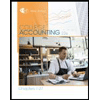
Accounting (Text Only)
26th Edition
ISBN: 9781285743615
Author: Carl Warren, James M. Reeve, Jonathan Duchac
Publisher: Cengage Learning
expand_more
expand_more
format_list_bulleted
Concept explainers
Textbook Question
Chapter 7, Problem 7.16EX
Merchandise inventory on the
Based on the data in Exercise 7-15 and assuming that cost was determined by the FIFO method, show how the merchandise inventory would appear on the balance sheet.
Expert Solution & Answer
Trending nowThis is a popular solution!

Students have asked these similar questions
Please provide the solution to this general accounting question using proper accounting principles.
what is the actual total direct materials cost? accounting question answer
Calculate the capital turnover accounting question
Chapter 7 Solutions
Accounting (Text Only)
Ch. 7 - Prob. 1DQCh. 7 - Why is it important to take a physical inventory...Ch. 7 - Do the terms FIFO, LIFO, and weighted average...Ch. 7 - If merchandise inventory is being valued at cost...Ch. 7 - Which of the three methods of inventory...Ch. 7 - If inventory is being valued at cost and the price...Ch. 7 - Using the following data, how should the...Ch. 7 - The inventory at the end of the year was...Ch. 7 - Hutch Co. sold merchandise to Bibbins Company on...Ch. 7 - A manufacturer shipped merchandise to a retailer...
Ch. 7 - Cost flow methods The following three identical...Ch. 7 - Cost flow methods The following three identical...Ch. 7 - Perpetual inventory using FIFO Beginning...Ch. 7 - Perpetual inventory using FIFO Beginning...Ch. 7 - Perpetual inventory using LIFO Beginning...Ch. 7 - Perpetual inventory using LIFO Beginning...Ch. 7 - Perpetual inventory using weighted average...Ch. 7 - Perpetual inventory using weighted average...Ch. 7 - Periodic inventory using FIFO, LIFO, and weighted...Ch. 7 - Periodic inventory using FIFO, LIFO, and weighted...Ch. 7 - Lower-of-cost-or-market method On the basis of the...Ch. 7 - Prob. 7.6BPECh. 7 - Prob. 7.7APECh. 7 - Prob. 7.7BPECh. 7 - Prob. 7.8APECh. 7 - Prob. 7.8BPECh. 7 - Control of inventories Triple Creek Hardware Store...Ch. 7 - Control of inventories Hardcase Luggage Shop is a...Ch. 7 - Perpetual inventory using FIFO Beginning...Ch. 7 - Perpetual inventory using LIFO Assume that the...Ch. 7 - Perpetual inventory using LIFO Beginning...Ch. 7 - Perpetual inventory using FIFO Assume that the...Ch. 7 - FIFO and LIFO costs under perpetual inventory...Ch. 7 - Weighted average cost flow method under perpetual...Ch. 7 - Weighted average cost flow method under perpetual...Ch. 7 - Perpetual inventory using FIFO Assume that the...Ch. 7 - Perpetual inventory using LIFO Assume that the...Ch. 7 - Prob. 7.12EXCh. 7 - Periodic inventory by three methods; cost of...Ch. 7 - Comparing inventory methods Assume that a firm...Ch. 7 - Lower-of-cost-or-market inventory On the basis of...Ch. 7 - Merchandise inventory on the balance sheet Based...Ch. 7 - Prob. 7.17EXCh. 7 - Prob. 7.18EXCh. 7 - Error in inventory During 2016, the accountant...Ch. 7 - Inventory turnover The following data (in...Ch. 7 - Inventory turnover and number of days' sales in...Ch. 7 - Retail method A business using the retail method...Ch. 7 - Retail method A business using the retail method...Ch. 7 - Retail method A business using the retail method...Ch. 7 - Retail method On the basis of the following data,...Ch. 7 - Gross profit method The merchandise inventory was...Ch. 7 - Gross profit method Based on the following data,...Ch. 7 - Gross profit method Based on the following data,...Ch. 7 - FIFO perpetual inventory The beginning inventory...Ch. 7 - LIFO perpetual inventory The beginning inventory...Ch. 7 - Weighted average cost method with perpetual...Ch. 7 - Prob. 7.4APRCh. 7 - Prob. 7.5APRCh. 7 - Lower-of-cost-or-market inventory Data on the...Ch. 7 - Retail method; gross profit method Selected data...Ch. 7 - FIFO perpetual inventory The beginning inventory...Ch. 7 - LIFO perpetual inventory The beginning inventory...Ch. 7 - Weighted average cost method with perpetual...Ch. 7 - Periodic inventory by three methods The beginning...Ch. 7 - Periodic inventory by three methods Pappas...Ch. 7 - Lower-of-cost-or-market inventory Data on the...Ch. 7 - Retail method; gross profit method Selected data...Ch. 7 - Prob. 7.1CPCh. 7 - LIFO and inventory flows The following is an...Ch. 7 - Costing inventory Golden Eagle Company began...Ch. 7 - Inventory ratios for Dell and HP Dell Inc. and...Ch. 7 - Comparing inventory ratios for two companies...Ch. 7 - Prob. 7.6CP
Knowledge Booster
Learn more about
Need a deep-dive on the concept behind this application? Look no further. Learn more about this topic, accounting and related others by exploring similar questions and additional content below.Similar questions
arrow_back_ios
SEE MORE QUESTIONS
arrow_forward_ios
Recommended textbooks for you
 Financial AccountingAccountingISBN:9781337272124Author:Carl Warren, James M. Reeve, Jonathan DuchacPublisher:Cengage Learning
Financial AccountingAccountingISBN:9781337272124Author:Carl Warren, James M. Reeve, Jonathan DuchacPublisher:Cengage Learning Financial AccountingAccountingISBN:9781305088436Author:Carl Warren, Jim Reeve, Jonathan DuchacPublisher:Cengage Learning
Financial AccountingAccountingISBN:9781305088436Author:Carl Warren, Jim Reeve, Jonathan DuchacPublisher:Cengage Learning Financial And Managerial AccountingAccountingISBN:9781337902663Author:WARREN, Carl S.Publisher:Cengage Learning,
Financial And Managerial AccountingAccountingISBN:9781337902663Author:WARREN, Carl S.Publisher:Cengage Learning, College Accounting, Chapters 1-27AccountingISBN:9781337794756Author:HEINTZ, James A.Publisher:Cengage Learning,Principles of Accounting Volume 1AccountingISBN:9781947172685Author:OpenStaxPublisher:OpenStax College
College Accounting, Chapters 1-27AccountingISBN:9781337794756Author:HEINTZ, James A.Publisher:Cengage Learning,Principles of Accounting Volume 1AccountingISBN:9781947172685Author:OpenStaxPublisher:OpenStax College College Accounting, Chapters 1-27 (New in Account...AccountingISBN:9781305666160Author:James A. Heintz, Robert W. ParryPublisher:Cengage Learning
College Accounting, Chapters 1-27 (New in Account...AccountingISBN:9781305666160Author:James A. Heintz, Robert W. ParryPublisher:Cengage Learning

Financial Accounting
Accounting
ISBN:9781337272124
Author:Carl Warren, James M. Reeve, Jonathan Duchac
Publisher:Cengage Learning

Financial Accounting
Accounting
ISBN:9781305088436
Author:Carl Warren, Jim Reeve, Jonathan Duchac
Publisher:Cengage Learning

Financial And Managerial Accounting
Accounting
ISBN:9781337902663
Author:WARREN, Carl S.
Publisher:Cengage Learning,

College Accounting, Chapters 1-27
Accounting
ISBN:9781337794756
Author:HEINTZ, James A.
Publisher:Cengage Learning,

Principles of Accounting Volume 1
Accounting
ISBN:9781947172685
Author:OpenStax
Publisher:OpenStax College

College Accounting, Chapters 1-27 (New in Account...
Accounting
ISBN:9781305666160
Author:James A. Heintz, Robert W. Parry
Publisher:Cengage Learning
Chapter 6 Merchandise Inventory; Author: Vicki Stewart;https://www.youtube.com/watch?v=DnrcQLD2yKU;License: Standard YouTube License, CC-BY
Accounting for Merchandising Operations Recording Purchases of Merchandise; Author: Socrat Ghadban;https://www.youtube.com/watch?v=iQp5UoYpG20;License: Standard Youtube License